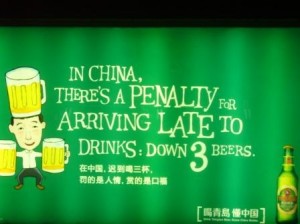It’s a Qingdao in any language, right?
I saw the following two ads on the subway in Shanghai (I apologize for the poor photography):
The ads were interesting for two reasons. First, the prominence of English in the advertisements was clearly directed at a very particular market, foreigners in Shanghai. I guess Qingdao has finally reconciled itself as the “beer of expats.” Second, the relationship between the message given in English and Chinese was markedly different.
Here’s the Chinese from the first ad:
The Chinese loosely translates: “In China, if you’re late drink three glasses [of beer]. The punishment is a form of politeness; The taste is a form of refreshment.”
The commentary on the custom in the Chinese is conspicuously absent from the English version.
Rewritten: 在ä¸å›½å–酒,会说“é’岛啤酒â€ï¼Œå¯èƒ½æ¯”ä¼šè¯´â€œä½ å¥½â€æ›´é‡è¦
The Chinese loosely translates: “When going out for drinks in China, being able to say “Qingdao Beer” could be more important than being able to say “hello.”
Here the Chinese emphasizes the importance of “Qingdao Beer,” instead of suggesting how much fun it is to learn to say “Qingdao Beer” in Chinese.
In English the ads target a market seen as wanting to learn Chinese and improve understanding of Chinese culture. In Chinese, the ads target a market where it is trying justify itself as a brand important in social interactions, especially interactions with those who might find “é’岛啤酒“ more important than “ä½ å¥½”.


